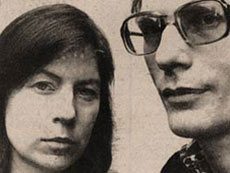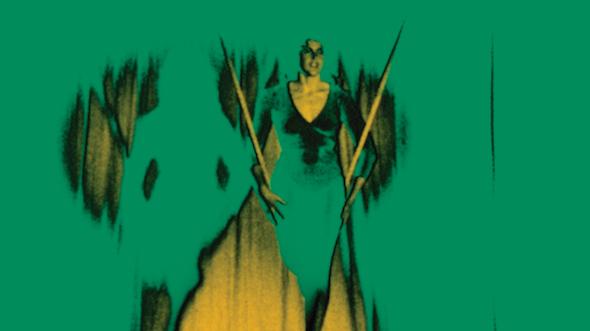The new BFI release takes its title from the 1977 essay movie directed by Laura Mulvey and Peter Wollen; the package includes its more speculative predecessor, 1974's Penthiselea: Queen of the Amazons. Each is a demanding feminist work that destabilises a Greek myth, thereby challenging the patriarchal oppression of women ingrained in it.
Riddles reconfigures Freud's phallocentric application of Sophocles' play by focusing on maternal agency. At its core is the evolution of a young mother whose story is told through thirteen 360-degree pans. Deserted by her husband and confined to such limiting spaces as her toddler daughter's bedroom and playground and a shopping mall, Louise (Dinah Stabb) is caught in a loop of societal expectations, the absence of cuts and Mike Ratledge's hypnotic electronic score emphasising her entrapment. Encouragingly, she finds employment, moves in with her girlfriend, and becomes active in setting up a workplace crèche.
 A pensive Mulvey (pictured right, with Wollen) explains the film on camera; in another section, closeups of vintage images of the Egyptian Sphinx dissolve into grain, casting doubt on the solidity of the Oedipal myth in psychoanalysis. In contrast, chemically bright shots of women acrobats celebrate freedom and possibility.
A pensive Mulvey (pictured right, with Wollen) explains the film on camera; in another section, closeups of vintage images of the Egyptian Sphinx dissolve into grain, casting doubt on the solidity of the Oedipal myth in psychoanalysis. In contrast, chemically bright shots of women acrobats celebrate freedom and possibility.
Penthiselea refutes centuries of women's silence. It opens with a mimed staging (accompanied by the angry clashing of weapons) of Heinrich von Kleist's 1808 tragedy of destructive sexual passion, which counters Homer by having the Amazonian queen kill Achilles before killing herself. Wollen then lectures on Kleist's rethinking of gender identities and his double suicide with his terminally ill friend Henriette Vogel; whereas the camera gazes on the unreceptive Mulvey (theorist of the "male gaze") in Riddles, it tires of her then-husband's pontificating and frequently wanders off. Why does Mulvey flick her hair and Wolllen avoid eye contact? Are these Freudian in-jokes?
An extended montage of antiquities, which stress the Greeks' misogynistic hatred of the Amazons, are scored to the howls, laughs, and gurgles of Cathy Berberian performing "Visage" (1961) – a magical voice in search of language. The actor Grace McKeaney, her face juxtaposed over the 1913 film What 80 Million Women Want – ?, revitalises the little remembered words of the suffragist Jessie Ashley.
There are myriad entry points into these dazzling experimental movies, even if they ask more riddles than they answer. Neither is as inaccessible to non-academics as the essays in the booklet suggest. (The single extra is an on-camera interview with Mulvey that's exasperatingly been shorn of the questions.) But they cannot be watched passively. "People should be prepared to make the same effort and approach a film in the same way as they would a book," Wollen wrote of Penthiselea – a thrilling proposition.













Add comment